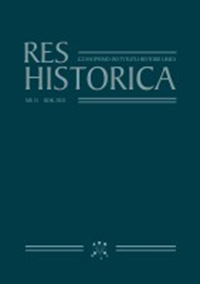The Polish and Jewish People in the Work of Peasant Self-Government in the Right-Bank Ukraine in the Second Half of the 19th and the Beginning of the 20th Centuries
The Polish and Jewish People in the Work of Peasant Self-Government in the Right-Bank Ukraine in the Second Half of the 19th and the Beginning of the 20th Centuries
Author(s): Kateryna MelnychukSubject(s): History
Published by: Wydawnictwo Naukowe Uniwersytetu Marii Curie-Sklodowskiej
Keywords: peasant self-government; volost; rural community; the right-bank Ukraine; South-Western region; the Polish and Jewish people; myrovyi poserednyk; governor
Summary/Abstract: The abolition of serfdom in 1861 was the beginning of global reformations that dealt with the administrative and territorial division of the empire. According to the new division, the lowest territorial unit was a rural community (territorial community) in Kyiv, Podolia and Volhynia guberniyas, the highest – volost. The control of rural communities was performed by peasant self-government – volost and rural government which were formed and provided by peasants (members of the community). However, excepting community affairs, the legislator charged the peasant self-government to execute a number of urgent functions in the government (fiscal, legal, police, static and educative functions). For that reason, the peasant authorities were degraded to the position of the lowest link in the hierarchy of the government. The peasant self-government was restricted by the resolutions and circulars of Ministry of Interior, general-governor, general, governor in peasant affairs and „myrovyi poserednyk”. As a matter of fact, the talent acquisition to the peasant self-government office was implemented with a number of restrictions established by the „Regulation on the peasants withdrawal from serfdom” in 1861. The specific characteristic of the right-bank Ukraine was the diversity of area, after the Ukrainians the second most populated were the Jewish people, the third – Polish. An impressive part of Polish and Jewish nationalities lived in peasant community so that there was a problem of their participation in the work of peasant self-government. Avoiding putting „chuzhynziv” (people who were not the members of peasant community) in the main positions of rural administration, the restrictions were implemented on the spot. Still, the position of clerk (pisar) was accessible for those wishing to work in volost or rural government. The article deals with the problem of human resourcing and the presence of Polish and Jewish nationalities in the peasant self-government in the South-Western region1 of the Russian Empire in the second half of the 19th – the beginning of the 20th centuries. The way of rotating workers in the rural administration, their level of education, professional achievements, employment and remuneration terms are emphasized in the article. Moreover, certain cases of working Jewish and Polish as clerks in rural administrations are described.
Journal: Res Historica
- Issue Year: 2021
- Issue No: 51
- Page Range: 387-402
- Page Count: 16
- Language: English

